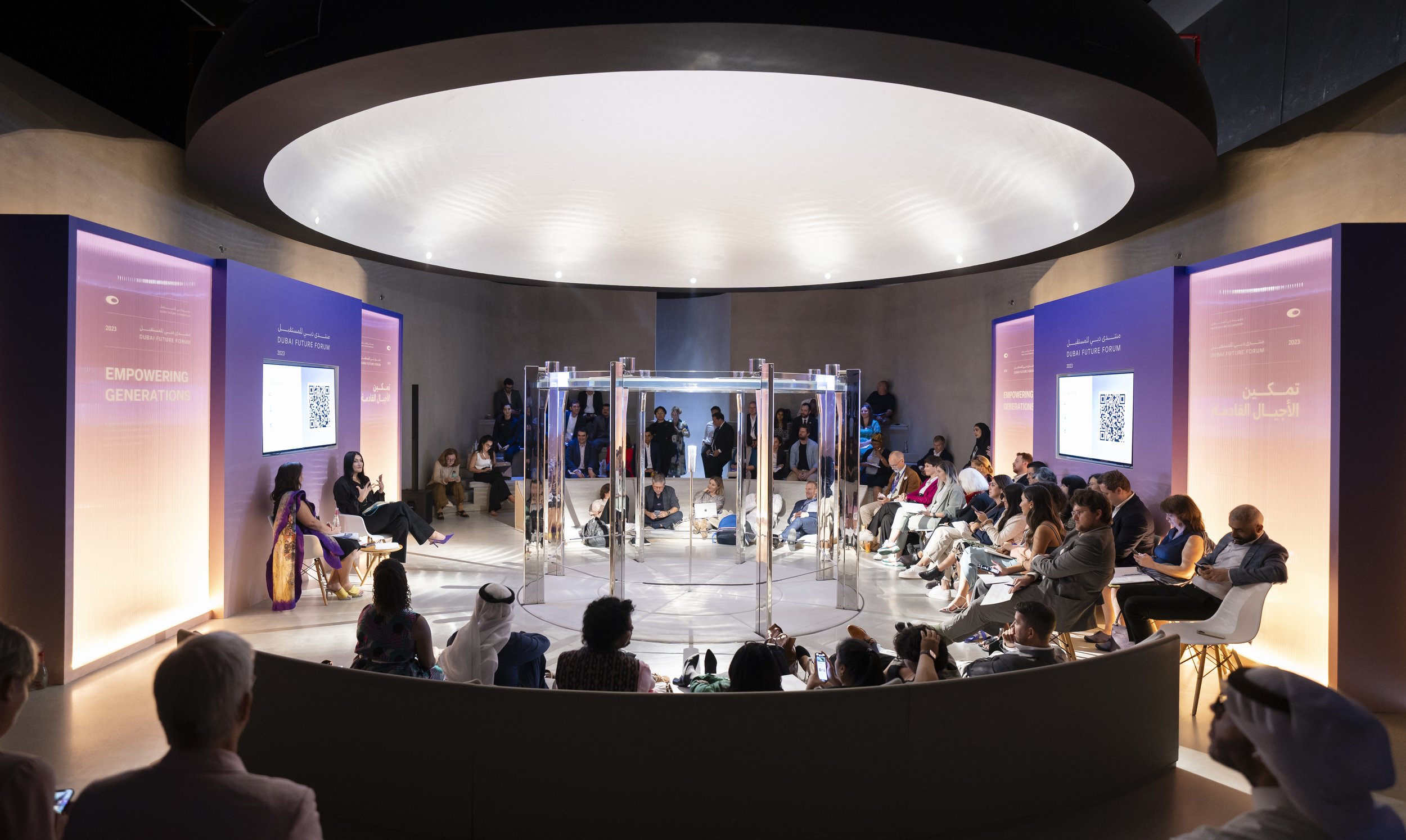
A Statement of Commitment
The Summit of the Future
The Pledge Network is an informal collective of more than 70 cross-disciplinary leaders with expertise across futures, foresight, anticipatory governance, wellbeing and future generations policy.
This statement aims to serve as a catalytic and unifying tool, in collaboration with existing efforts, to make the Summit of the Future the transformational global moment that the world demands. We, the School of International Futures and Foundations for Tomorrow, as two non-profit conveners within the global foresight and future generations community, seek to mobilise awareness and input from leading practitioners in service of this goal. We will review progress in a year, at the 2024 Dubai Futures Forum.
*Commitments to this pledge are completed within the personal capacity of individuals.
The Pledge
As we mobilise over the coming months around the opportunity of the Summit, a Pledge will unite this community and signal our intent:
We commit to mobilising our efforts in a unified and collaborative joint strategy for an ambitious Summit of the Future in 2024, as a catalysing moment for building local, national and global governance for the future we need.
The Summit of the Future provides a critical moment for reclaiming realistic optimism towards our common futures and committing to building the anticipatory governance this century demands.
We advocate for an intergovernmental agreement that includes:
An ambitious Declaration for the rights of Future Generations,
The appointment of a strategically positioned and well-resourced UN Special Envoy for Future Generations,
Substantive commitments to build futures-oriented governance,
Obligations to institutionalise the principle of intergenerational fairness.
We will do so by:
Collaborating across disciplines and in alignment with the 2030 Agenda,
Committing to unwavering solidarity between current and future generations, while placing global majority countries at the heart of the debate,
Mobilising progress across the local, national and global levels,
Showcasing existing and emerging initiatives across UN member states to foster knowledge sharing and increased ambition.
The Opportunity
-
The present is overloaded with an ecological emergency, overlapping inequalities and a governance crisis. A sense of overwhelming uncertainty, insecurity, and associated pessimism and helplessness permeates the global arena. The impact of the COVID-19 pandemic, rising geopolitical tensions and unfolding conflicts have compelled us to re-examine our approach to our shared future. Central to these ambitions is the 2030 Agenda, with the 17 Sustainable Development Goals (SDGs) designed to lead humanity toward a future defined by equity, prosperity, and sustainability. However, the journey towards achieving the global vision of a prosperous, secure, sustainable and fair future described in the SDGs is marked with hurdles. The speed of progress is wanting, with many highlighting the need to update governance and political institutions on the national and international level to ensure that they are fit for the challenges and opportunities of this century. Efforts surrounding the Summit of the Future should build on the substantive efforts of the 2030 Agenda, pushing against fragmentation and dilution of efforts.
-
which neglect long-term interests. Progress is being made through championing the adoption of foresight, building anticipatory governance, integrating intergenerational fairness principles and legislating for the wellbeing and rights of future generations. These innovations will enable the “turbo-boosting” that is so needed to fulfil the promise of the 2030 Agenda. Capitalising on future opportunities and mitigating anticipated risks could provide a much-needed reinvigoration of the journey ahead.
-
However, this window of opportunity will not last forever. We have the opportunity to capitalise on the innovative thinking, global political leadership, and appetite for solidarity of this moment before the impacts of generational conflict, biodiversity loss, and exponential inequality start creating irreversible damage to our human and planetary wellbeing. Renewed solidarity requires connecting futures-oriented governance innovations across member states, the UN and civil society.
-
Whilst being distinct from ‘future generations’, young leaders offer essential insights while also having the willingness and optimism to fight for a better future. Intergenerational coalitions can unlock urgent action by breaking down barriers that preclude intergenerational solidarity and fostering mutually trusting relationships.
The 2024 Summit of the Future has the potential to turn these aspirations into action. Strategically placed to build on commitments made at the 2022 Transforming Education Summit and the 2023 SDG Summit while also laying the groundwork for the World Social Summit in 2025 and the final SDG Summit in 2027, the Summit of the Future can inject a sense of renewed global cooperation championed through intergenerational solidarity.
-
The Summit of the Future is an opportunity to move beyond the discussions of the ‘what’ and ‘why’ of change that are so often the focus of these convenings and traverse the territory of ‘how’ action should be taken, capturing concrete commitments to safeguard our future. By building on the increased public appetite for the reimagination of the multilateral system that accumulated in response to the 75th Anniversary of the United Nations, the Summit should be used as an opportunity to unlock and catalyse action across local, national and international levels.
-
These communities have a unique contribution to make to this agenda, yet are often the most impacted by the challenges of the 21st century. Proactive efforts to rebalance this dynamic are essential to a just and transformational Summit of the Future.
Our Commitments & Proposals
-
made possible through collaboration at the highest levels and ensure that we:
Cultivate concrete commitments to drive progress towards a transformational Summit of the Future,
Foster the partnerships and networks required to embed resilience and effective foresight capabilities across national governments to strengthen public sector capabilities and unlock accelerated delivery of the SDGs,
Develop the skillsets, mindsets and innovations required to respond to the evolving development needs of Member States.
-
Active participation and contribution to consultative processes conducted by co-facilitators of the Summit of the future.
Raising awareness of existing initiatives and driving increased ambition for the summit at the local, national and regional levels.
After the Summit, efforts must focus on mobilising high-quality implementation of commitments at the national level.
-
Surfaces the challenges we face while acknowledging that this is a moment for realistic optimism about the future that can channel hopeful determination to drive rapid national and international governance reforms;
Treats the global context as an interconnected and indivisible whole and focuses on action beyond the 2030 threshold of the SDGs, looking at least a generation into the future.
Brings to the fore the connections and common causes between different governance innovations, including; measuring what we value, beyond GDP, meaningful youth engagement, intergenerational fairness, solidarity, foresight, future generations, well-being economics and existential risk.
Appointing the UN Special Envoy for Future Generations, ensuring they are representative of global majority communities, before the Summit and ensuring this position is supported by the necessary resources to drive transformation.
Supporting genuinely innovative and tangible practices worldwide that protect the rights of current and future generations, including policy innovations, new institutions, meaningful youth engagement, demonstrator projects, and national listening exercises to be showcased at a national level and the High-Level Political Forum.
Integrating insights from young leaders, leveraging foresight practices and anticipatory governance to consider the interests of future generations across the remaining thematic tracks of the Summit of the Future.
A Declaration on Future Generations, which enshrines the rights of future generations as a practical instrument to drive legislative and institutional reforms at the national level.
A fundamental commitment to fairness for current and future generations, including the need for effective intergenerational dialogue and assessment of public policies from the standpoint of intergenerational fairness — ensuring policies and decisions speak to the needs of future generations, with accountability mechanisms to assess their intergenerational distributional impact.
A high-ambition capability-building programme to adopt strategic foresight and intergenerational fairness approaches in the UN and across Member States, including commitments to building capability for a foresight ecosystem at all levels of government and to run “national listening exercises” that connect all generations into policy-making in support of the 2030 Agenda’s “new approach” to multilevel (local, subnational and national), multi-stakeholder, and multilateral public administration and anticipatory global governance.






